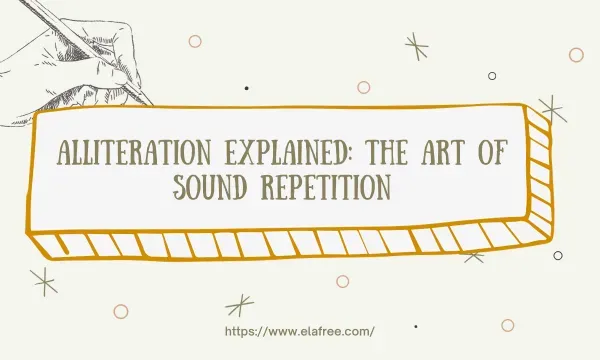Alliteration Explained: The Art of Sound Repetition
Alliteration is a literary device that involves the repetition
of the same initial sound in a series of words. It's often used in poetry,
prose, and tongue twisters to create rhythm, draw attention to a
particular section, or make a piece of writing more memorable. Let's break
it down:
Definition:
Alliteration: The repetition of the same initial consonant sound
in two or more closely placed words or syllables.
Key Points:
1-Purpose: Alliteration can serve various purposes in
literature:
- Rhythm: It can introduce a rhythmic pattern, making the text more musical.
- Emphasis: By repeating sounds, it can draw attention to specific words or ideas.
- Mood: It can help set the mood or tone of a passage.
- Memorability: Phrases or lines with alliteration are often easier to remember.
2-Usage: While commonly associated with poetry, alliteration is
also found in prose, advertisements, everyday speech, and even brand
names.
3-Not Limited to Consonants: Although traditionally associated
with consonants, some literary scholars argue that alliteration can
involve vowel sounds too.
4-Difference from Assonance and Consonance:
- Assonance: The repetition of vowel sounds in closely placed words (e.g., "The cat sat on the mat.")
- Consonance: The repetition of consonant sounds, but not necessarily at the beginning of the words (e.g., "The wind whined and dined.")
Examples:
- Poetry: "Peter Piper picked a peck of pickled peppers."
- Brands: "Coca-Cola", "Dunkin' Donuts", "Best Buy".
- Literature: "From forth the fatal loins of these two foes; A pair of star-cross'd lovers take their life." - Romeo and Juliet by William Shakespeare.
Why is it Effective?
Alliteration appeals to the auditory senses of the reader or listener.
When used effectively, it can make a piece of writing sound harmonious.
This harmony can evoke emotions, create emphasis, or simply make a text
more engaging and memorable.
In Conclusion:
Alliteration is a versatile literary device that, when used judiciously,
can enhance the auditory appeal of a text. Whether in the playful lines of
a poem or the catchy slogan of an advertisement, its rhythmic and
repetitive nature captures attention and leaves a lasting
impression.

